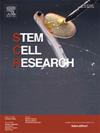从一名 AUTS2 综合征患者身上建立非整合 iPS 细胞系(SDQLCHi072-A)
IF 0.8
4区 医学
Q4 BIOTECHNOLOGY & APPLIED MICROBIOLOGY
引用次数: 0
摘要
本研究中,用于重编程的 PBMCs 来自一名经临床和基因诊断证实患有 AUTS2 综合征的男孩。所建立的 iPSCs 具有相似的外观,并在 mRNA 和蛋白质水平上表达多能性标记。此外,iPSCs 还具有良好的体内分化能力和正常的核型。这是研究 AUTS2 综合征和筛选药物治疗的有效潜在模型。本文章由计算机程序翻译,如有差异,请以英文原文为准。
Establishment of a non-integrated iPS cell line (SDQLCHi072-A) from a patient suffered from AUTS2 syndrome
In this study, PBMCs used in reprogramming were from a boy suffered from AUTS2 syndrome confirmed by clinical and genetic diagnosis. iPSCs were established by non-integrated method, which carried AUTS2 heterozygous mutation. The established iPSCs presented similar appearance and expressed pluripotent markers in mRNA and protein level. Additionally, the iPSCs possessed favorable differentiative capacity in vivo and normal karyotype. This is an effective potential model for the study about AUTS2 syndrome and the screen about drug therapy.
求助全文
通过发布文献求助,成功后即可免费获取论文全文。
去求助
来源期刊

Stem cell research
生物-生物工程与应用微生物
CiteScore
2.20
自引率
8.30%
发文量
338
审稿时长
55 days
期刊介绍:
Stem Cell Research is dedicated to publishing high-quality manuscripts focusing on the biology and applications of stem cell research. Submissions to Stem Cell Research, may cover all aspects of stem cells, including embryonic stem cells, tissue-specific stem cells, cancer stem cells, developmental studies, stem cell genomes, and translational research. Stem Cell Research publishes 6 issues a year.
 求助内容:
求助内容: 应助结果提醒方式:
应助结果提醒方式:


